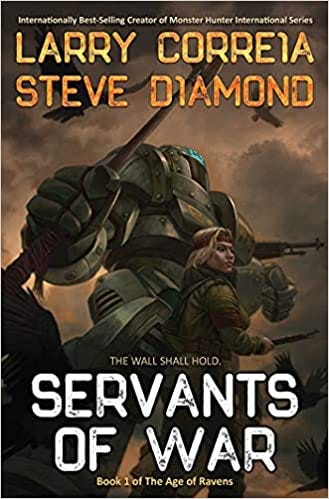#BookReview: Servants of War, by Larry Correia and Steve Diamond
World War I with magic golem mech suits
Illarion Glaskov is a big, nearsighted farm boy living in the northern reaches of Kolakolvian Empire, far from the never-ending war with the Almacians. But when monsters attack his village, he discovers that it was because the men of the village forsook their pact to serve the Tsar. Now, Glaskov must fulfill his part of the bargain or perhaps suffer an even worse fate.
Glaskov finds himself conscripted into The Wall, a unit of soldiers who pilot suits of armor built from the parts of dead golems. Through his training and combat experience, he learns what it means to sacrifice for country: that its not all it is cracked up to be. But he also comes to understand that what really matters are having the backs of his comrades beside him and protecting the people he loves.
Story
Servants of War begins as a coming of age story with basic training at The Wall - a unit of magic powered armor soldiers - and ends up going straight to Hell. Literally. By the end, the heroes enter another world that can only be described as hellish. And there are plenty of battles, both internal and external, along the way. The authors break up the intensity of over the top trench warfare with glimpses of the intrigue that goes on in the halls of power in the Kolakolvian Empire.
Seemingly disparate narratives are pieced together to reveal a plot more nefarious than Almacian superweapons and more dangerous than a 100-year war. Throughout the story, there is plenty to keep the reader guessing while still feeding enough information to feel like the author is not hiding the ball. I often find myself frustrated with stories that keep information from me to preserve the mystery, and I never felt that way with Servants of War.
The characters
Illarion Glazkov might be the only decent human being in the Empire. But the hero of Servants of War does not come off as a Mary Sue, nor a self-righteous prick. His decency is tied with a rustic naiveté that he must shed to survive in the trenches, but his struggle is to retain his humanity at the same time. That becomes more and more difficult to do when he becomes entangles with the plots of Kristoph Vals, one of the top men in the Tsar's secret police. Vals is a great antihero, at once amoral and compelling, and his clashes with Illarion create a clear contrast between their values and methods.
If Vals acts as the devil on Illarion's shoulder, Natalya Baston is his angel, though a ruthless one who is a crack shot with a sniper rifle. As a Rolmani, Baston is not an ethnic Kolakolvian. She only acts as a scout and spy for the Empire against her will, only doing so because the Tsar holds her family hostage. When she meets Illarion, she realizes that not all Kolakolvians are evil bastards, just most. When the two of them are drafted into a suicide mission, they learn to rely on each other and to protect each other from the machinations of the Empire.
I found the characters of Servants of War to be both engaging and relatable, including some of the minor players and foils. Illarion's opening tragedy could have had more bite if the authors had been given more time with the village before, but that is the tradeoff between a gripping opening and connecting to background characters. To be honest, the subject matter is grim enough, and it is thankful that the reader does not have to fully experience Illarion's pain.
The world
The world of the Servants of War is what happens when you take the denizens of Eastern and Central Europe from their homes, drop them into the trenches of World War I France, and throw in magic powered armor suits and corpse-eating ghouls. The real-world mythology of Slavic and Eastern Europe is true in this world. There are the equivalents of Orthodox Christians and Jews, as well as Slavic Paganism. This confused me until it was revealed that all of the inhabitants of the world in Servants of War originated from our own world, and is now populated by those who had crossed over into the magic realms and were lost to our own forever.
Thus, you get clear analogues to the Germans with the Almacians, the Russians with the Kolakolvians, the Czechs or Jews with the Prajans, and the Roma with the Rolmani. Baba Yaga and her two sister witches or goddesses play a prominent role in Illarion's story. It felt like I only had a glimpse of the world hinted at, as if there were vast territories and mythologies to explore in future books.
The politics
There is nothing in the way of real-world politics in Servants of War, but one might draw some inferences given the consequences of Illarion's draft-dodging village, the ethics of using chemical weapons of mass destruction, and the persecution of minorities in the Kolakolvian Empire.
Content warning
The world of Servants of War is a grim place, and there is plenty of horror to be found. Soldiers are shot, decapitated, blown to pieces, and torn apart by dogs. People and animals are dissolved with corrosive chemical gas. There is probably more that I am forgetting, but you get the idea. Violence and gore aplenty.
Who is it for?
Servants of War is for anyone who likes fantasy, horror, and military fiction and a gritty World War I aesthetic.
Why read it?
Servants of War brings equal parts combat and horror in a grim and unforgiving world, but it manages to avoid hopelessness and nihilism, instead embracing human virtue and self-sacrifice. In this day and age, that is certainly an accomplishment.




